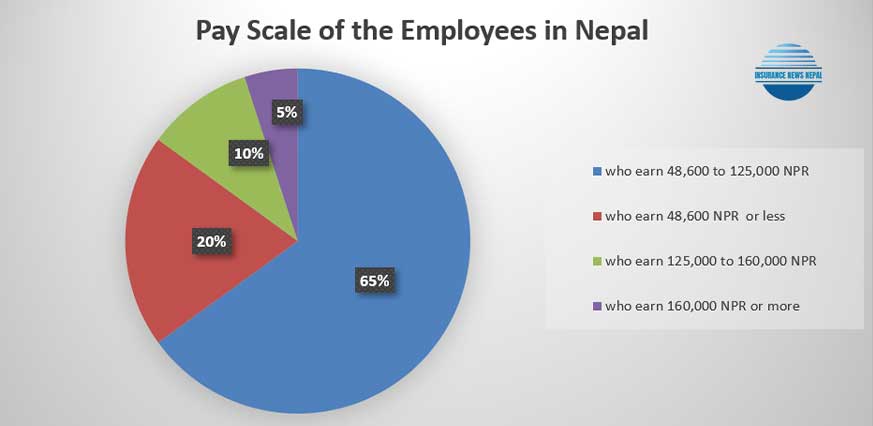
The average salary in Nepal is the monthly earnings of an individual i.e. how much you earn monthly in a year. The average salary in Nepal is fundamentally based on the experience and qualifications of an individual. It is a division of your yearly salary with your working months. Once you discover your yearly salary divide it by 12 to find how much you’ll earn monthly. In this article, we will learn about the average range of salary to the factors that affect the level of pay.
According to data from wageindicator.org, the Ministry of Labour, Employment and Social Security, Nepal has set NPR 17,300.00 (USD 130.53) as the current minimum wage in Nepal for the year 2023. The average minimum salary an employee can earn is 20,400 NPR per month, while the maximum average salary in Nepal is 360,000 NPR per month.
In Nepal, on average, people’s salaries increase by 4% every 29 months. Meanwhile, across the world, the typical salary increase is 3% every 16 months.
You May also need this:
Net Salary Calculator Nepal: Instantly Determine Your Net Earnings
Pie Chart of the Pay Scale of Average Salary in Nepal

Newly fixed wages of the employees in Nepal
The revised minimum wage for workers in Nepal, as of August 18, 2023, is given below
| Minimum Wages | Monthly | Daily |
| Basic Wages | NPR 10,820 | NPR 415 |
| Allowance | NPR 6,480 | NPR 250 |
| Total | NPR 17,300 | NPR 665 |
Note: The above amounts are without the addition of the provident funds and allowances that a company provides its workers. Different companies have distinct rates on this so the salary should be provided in accumulation to other expenses.
The above salaries are applicable for the following types of employees:
- Regular or Permanent Employees: Regular or permanent employees are those who have been hired to carry out a specific job for as long as he/she is an employee of the company.
- Time-based employees: The employees who are hired for a certain period on a certain work temporarily are called time-based employees.
- Work-based employees: The employees who are hired to perform a task and are done after they complete it are based employees.
- Part-time employees: The employees who are hired to do less than a full-time job or are supposed to do fewer hours a week than a full-time time are casual.
- Casual employees: Casual employees are those who are hired for a week or month not more. It is a combination of time-based and work-based employment.
The revised minimum wage for workers in Nepal, as of August 18, 2023, in “Tea Estates”, is given below:
| Minimum Wages | Monthly | Daily |
| Basic Wages | NPR 8,934 | NPR 343 |
| Allowance | NPR 4,959 | NPR 191 |
| Total | NPR 13,893 | NPR 534 |
Factors Affecting Salaries in Nepal
In Nepal, several factors influence the salaries individuals earn. Let’s take a closer look at them:
1. Education: Education and salary are correlated, your level of education and skills impact your earning potential. Generally, higher levels of education lead to better-paying job opportunities.
- If you have a high school education, someone with a diploma could earn about 17% more than you.
- A graduate could earn approximately 24% more than you if you’re a diploma holder.
- For those with a Bachelor’s degree, a postgraduate could enjoy a salary that’s around 29% higher.
- Finally, employees with a Ph.D. degree may earn about 23% more than those with a postgraduate degree.
2. Industry: Occupational wages vary on what industry you work in. The industry with better financial conditions and higher investment provides larger salaries to their employees whereas small industries provide lesser salaries. However, salary also depends on your qualifications no matter which industry it is.
3. Experience: Experience refers to everything you have accomplished until the date when you apply for a certain job. Almost all of the employers search for work experience in months and years. When a person enters a firm there’s no way to determine salary for him/her. So, the experience that the candidate has can determine the pay.
4. Job Position: The specific role or position you hold within a company affects your salary. Leadership positions and roles with more responsibilities usually come with higher compensation.
5. Location: Salaries can vary based on the geographic location of your workplace. Urban areas or regions with a higher cost of living may offer higher salaries to offset expenses. However, it’s essential to recognize the gap between urban and rural areas, where salaries in urban centers tend to be higher.
6. Government policies: The government makes certain policies to protect employees’ interests. The employees should be paid as per the government regulations and policies by the employer. Benefits such as PF, medical expenses, transportation facilities, and pension should be included in the salary.
7. Management Attitude: The working capacity and ability to manage activities in the organization influence wage determination. Some reputed and professional business organizations prefer to pay according to how much profit the employee gains for the organization.
You May Also like:
Frequently Asked Questions for Average Salary in Nepal
How can I calculate my average salary?
Are the average salary and monthly salary the same?
Does the salary of males and females differ in the same job?
What is the minimum wage in Nepal?
Conclusion
In a nutshell, there are no better options to get paid better if you lack the required experience and qualifications in Nepal. There are increments made from time to time. The government updates the new pay scale within the yearly period. Nepal Labour Act maintains the rules and policies on how the work needs to be carried out.

